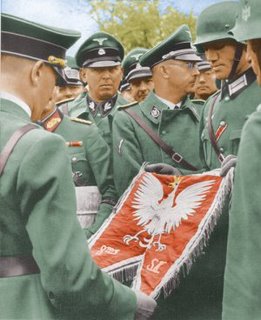The Invasion of Poland - Einsatzgruppen
 “What will you have, Rudolf?”
“What will you have, Rudolf?”“A beer, please.”
“Maybe you’d like a vodka as well. It will help keep you warm in this freezing weather.”
“Thank you, Hans.”
Hans wants him to relax more. He comes back with the drinks, and waits for Rudolf to finish the vodka.
“I got a feeling that Poland was no holiday camp, Rudolf. We didn’t get any information here. I was worried about you, and I didn’t know that you were injured. You know they tell us nothing here. Everything is top secret.”
Rudolf is feeling a little better.
“Yes. I know, Hans. It was the same with the regiment. Everything was secretive. It was a bloody mystery tour.”
“Ha ha ha. Now you’re coming back to your old self. I’ll get another round of drinks. It can be great medicine on occasions, comrade.”
“Thanks, Hans.”
“To the good times. Prost!”
“What I tell you is in confidence, Hans.”
“You know what I think of you, comrade. This is between two SS-men. My lips are sealed.”
Rudolf is desperate and needs someone to talk to - otherwise he’ll explode. He can’t take it any longer.
“I don’t know what to say, but I’ll do my best. It’s not like working in Sachsenhausen. In the camp we deal with inmates with numbers. They wear striped clothes and have shaven heads. They have no identity and they all look the same. They match their grey environment filled with the deadness that surrounds them. The watch towers, the searchlights, the electrified fences. It’s like a strange factory that isn’t real.”
Hans never thought of it like this.
“That’s interesting, Rudolf.”
Rudolf can’t stop.
“When you see people in their own clothes, with their own personalities and identities, surrounded by their families and friends it affects you differently, because they are real living people.
It’s many different things. When you go into their villages and their houses you see people who share a similar life style to you, sometimes with similar problems. They have their family photos on the wall and on the sideboards, and are surrounded by their mementos. Their whole life and all the different aspects of it are looking back at you. A pram in the corner, a baby’s bottle on the floor, with a few scattered toys beside it. An unpaid bill on the table beside a broken wireless set, which someone was trying to fix. Sometimes you see a birthday cake on the sideboard beside a birthday card. It’s not killing. It’s a desecration. It’s elimination. It’s like you’re killing God. It’s like you’re killing yourself. You feel stinking and contaminated from head to toe. It’s evil. They are no different to you. When you kill them you kill yourself.”
Hans is shocked and mesmerised, and sees that Rudolf is crying. He’s in a terrible state.
“Don’t worry, Rudolf. I’m listening.”
“I saw a photo of a man on the wall of one of the houses, and he looked identical to my own father. The expression, the smile, everything. When I went outside I saw him on the street, lying among lots of other bodies, with his head thrown back and his eyes and mouth open. His hands were by his side and he looked like he was asleep, except for his face and the position of his head. He looked like life had just escaped from him, and his face was still frozen with a strange and terrifying expression. His frantic, bewildered looking eyes were staring straight up at the sky. He even had an Adam’s apple like my father.
There’s a dark haired woman about 35 years old lying on her side facing him. Her hand is touching him like she had just said good-bye. She looks almost happy that they went together. On the other side of them are three bodies grotesquely knotted together, one of them with a terribly distorted face, and nearby is a small motionless dog looking like he was having a sleep.
It killed me inside. It finished me. There’s nothing left in me. I will never forget it, never.”
Hans is feeling very uncomfortable and doesn’t know what to say. He can see that Rudolf has serious problems.
“Go on, Rudolf. You know you’re with a real friend.”
“Everything together was too much. I walked along the street in a trance and saw a black and tan German shepherd the same colour as my dog ‘Sergeant’. He was doing everything to protect his owner. Someone shot him and he continued to defend him with his stomach hanging out. I’ll never forget the screams. I aimed at his head even though it was difficult to see, because of the tears in my eyes, and eventually the giant dog slumped to the ground resting at the foot of his master.
Hell had paid a visit to Wloclawek. The dogs, and cats, and everything were in distress. Some of them were running around in circles. Even the birds were filled with trauma, banging and flapping around in their cages. The wild birds had flown away.
The terror, the cries, the agonising screams, the groaning, the howling were all around me. They were inside and outside my head all at the same time.
I’m going mad. I want to kill myself.”
(L.Hellmann, When the lights went out, 2006)
Interesting links:



